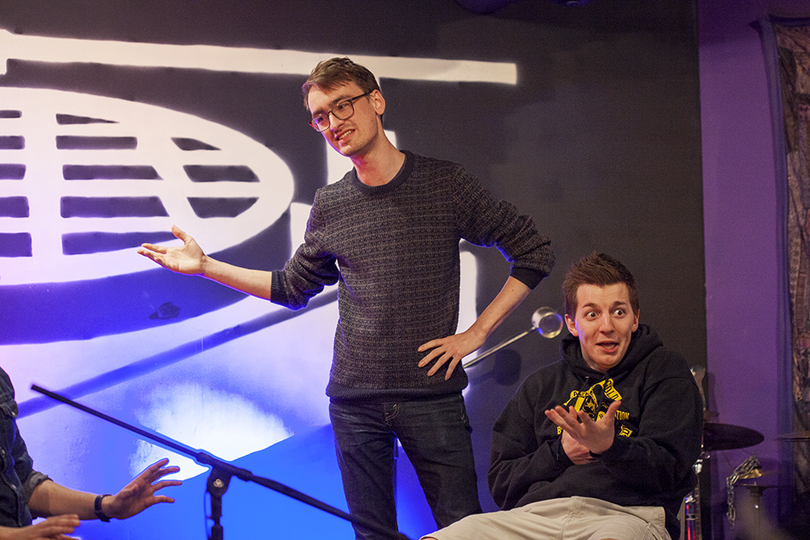Ties to Thailand: Students take action to aid displaced Karen refugees in city, across world
When Darcy Cherlin walked through the Thailand jungle with a group of Karen refugees during her winter break, the only thing in sight was the vast green jungle and a few houses made of simple bamboo and cement.
She spent four weeks in Thailand to better understand the issues the Karen faced there, so she could better understand the refugees she’s been working with in Syracuse, N.Y. Seven hundred Karen refugees reside in the North Side of Syracuse, but they still don’t have the medical care they need.
Cherlin, a senior anthropology major, and Alison Joy, a senior Italian and television, radio and film dual major, organized a fundraiser for the Karen refugees on Saturday night at Funk ‘n Waffles to raise money for internally displaced Karen in Thailand. People could also donate clothing instead of money to help Karen refugees in the Syracuse area. Improvisational comedy group Best Restaurant In Town opened up the event and musicians Jeff York and Zeke Leonard followed.
“We have a very large refugee community here, and it’s hard enough trying to adapt to a completely new country and new circumstances,” Joy said. “It’s the least we can do to collect clothing, towels and sheets for them.”
The Karen are an ethnic group from Burma, current-day Myanmar. Persecuted by the Burmese military regime, they were forced to flee the country to the border of Thailand in order to escape rape, torture and forced labor. The ethnic group lives in nine camps in the jungles of Thailand as “internally displaced” peoples — they haven’t been granted refugee status, so they are permitted to live in certain areas, but need permits to travel elsewhere. Others have resettled in other countries, including Australia, Canada and the United States.
Cherlin first became interested in the Karen during her freshman year, when she learned about them in one of her anthropology classes. Her interest continued to grow when she began tutoring Karen refugees in Syracuse. Later, for her Renèe Crown University Honors Program capstone project, Cherlin studied how the Karen are accessing health care in the U.S., Australia and Thailand.
With honors program funding, Cherlin spent six months abroad in Australia during the spring semester of her junior year, where she worked closely with Karen refugees. On a return trip over winter break, she was able to travel from Australia to Thailand with refugees, and meet displaced Karen in the Thailand jungle.
“She was living with Karen refugees in a jungle village for more than a month, traveling around with them to hospitals and medical facilities,” Joy said.
During her time abroad, Cherlin became aware of the difficulties the Karen faced trying to get medical care, and of how a little money can make a big difference in their community. While traveling to Palau on the border of Thailand and Myanmar, she witnessed a motorcycle crash. Her group pulled over and helped two women who had been hurt get to the nearest Thailand hospital, which was hours away. Cherlin was worried for one of the women, who needed surgery but didn’t have any health insurance. To her surprise, after a successful surgery, the woman’s bill was a mere $300. She couldn’t believe how inexpensive it was.
“A little money here goes a long way there, and I can definitely raise some money,” she said.
Cherlin explained that the U.S. government usually resettles Karen refugees in cities where the cost of living is low, like Syracuse. But with few resources, adjusting to life in Syracuse can be difficult.
The language barrier is one of the biggest obstacles the Karen face, Cherlin said. Not only does that limit their ability to get valuable employment, but she also said it is extremely difficult for them to seek medical help.
Unable to speak English, many Karen have trouble making appointments, Cherlin said. At the hospitals they have interpreters, but oftentimes don’t know medical terms or how to read prescriptions. She added that they also don’t have the transportation they need to get to local hospitals, and often walk miles in the harsh winters to get to one.
Although clothing and monetary donations are always helpful, the refugee center in Syracuse, a branch of the Catholic Charities of Onondaga County, needs more engagement from the community, Cherlin said.
“One of the women I worked with goes to Minnesota where other refugees are and they’re doing really well,” Cherlin said. “When she comes here she says they aren’t doing as well. They have very limited resources here.”
Cherlin is also working with the refugee center in Syracuse to connect professionals to the Karen people. She worked to have a doctor speak to the Karen about kidney function and disease. She is also having someone from the Syracuse University Counseling Center talk to them about depression, which she said is often a common problem among refugees.
Cherlin and Joy both agreed they would be satisfied if all they did was raise awareness about the Karen. At the benefit show on Saturday, they were able to raise money to help fund a lens transplant for a man in Palau and to donate to the Karen refugees in Thailand, Cherlin said.
Said Joy: “I am continually amazed at what you can accomplish at this university if you just vocalize your idea. Everyone wants to help in whatever small way they can.”
Published on April 8, 2014 at 12:48 am
Contact Jocelyn: jdelaney@syr.edu







